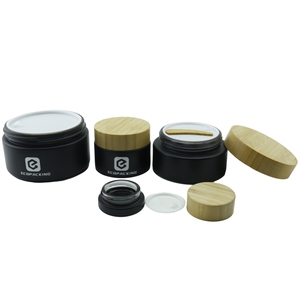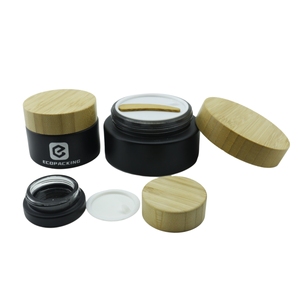(299 products available)
































































































































































































































































10-gram glass containers are small packaging vessels commonly used to hold and store products that weigh around 10 grams. These containers are made from glass, which is a material known for its transparency, sturdiness, and ability to provide an airtight seal. Below are the commonly used types of 10-gram glass jars and other containers.
10 Gram Glass Jars
Glass jars come in many shapes and designs. Some jars have wide openings to make scooping out content easy. Others are short and wide, offering a unique look for products. These different shapes and designs meet the needs of brands and the preferences of consumers. Whether a brand wants a classic look or a modern design, there is a glass jar type that fits. These glass containers are versatile. They can package creams, balms, sauces, and more, making them suitable for different industries. Using glass jars shows a brand's commitment to quality. Glass is a premium material that adds value to products inside. When consumers see glass jars, they associate them with higher quality and safety. Brands can use glass jars to convey a message of trust and reliability.
10 Gram Glass Vials
Glass vials are small, cylindrical containers with tight-fitting tops. They are perfect for storing sensitive products and come in different types of caps. Vials are commonly used in laboratories to hold liquids, chemicals, and samples in a secure manner. In the pharmaceutical industry, glass vials are used to package essential oils and injectable medications, keeping them safe from contamination. Glass vials are also popular in the cosmetic sector. They are used to contain serums, fragrances, and other valuable skincare and beauty products. The airtight seal ensures that the products maintain their quality and effectiveness.
10 Gram Glass Bottles
Glass bottles are another popular option. When storing liquid products such as essential oils, serums, or tinctures, bottles are the ideal choice. Like jars, bottles also come in various designs ranging from dropper tops to spray lids which make them convenient for different applications. The design of the bottle often guides how a product is used. For example, bottles with droppers allow precise dispensing of oils or tinctures. This prevents waste and ensures users get the right amount every time. This convenience can improve customer satisfaction and repeat purchases. Whether in a health store or a beauty salon, glass bottles project an image of quality and safety. The clarity of glass allows consumers to see the product inside, which can influence their buying decisions. Using bottles communicates a message of trust and transparency.
Various designs are available for 10-gram glass containers, which can accommodate different needs and tastes. These containers are typically small and intended for storing items such as powders, creams, and other samples.
Clear glass jar
This is a fundamental design that prioritizes clarity and simplicity. A clear glass jar has a transparent body enabling users to see the contents inside easily. These jars usually come with different types of closures, including metal lids, plastic caps, or corks. They are widely applicable for storing creams, powders, and small items like beads and nails.
Frosted glass jar
A frosted glass jar has a semi-opaque finish achieved through a frosted coating process. The frosted finish provides a better grip and an elegant, soft touch. These jars are great for high-end cosmetics, moisturizers, and other luxurious creams.
Tinted glass jar
A tinted glass jar has a colored or shaded glass that offers a unique look and some UV protection. These jars are available in various colors, including amber, green, and blue. They are suitable for products that benefit from UV protection, like essential oils and herbal extracts.
Square glass jar
While most glass jars come in round shapes, square glass jars provide a different form factor. Square jars are easy to store, stack, and organize. They have the same clarity and frosted finishes as other jars, and they are ideal for storing spices, creams, and gourmet food products.
Decorative glass jars
These 10-gram glass containers have intricate designs or patterns on the glass surface. The decoration can include embossed designs, etched patterns, or decorative lids. They add an aesthetic appeal to any setting and can be used for storing creams, powders, and decorative items.
Apothecary jars
Apothecary jars are traditional glass jars reminiscent of old-fashioned apothecaries. These jars usually have a round lid and a wide opening. They are great for storing bulk powders, herbs, and other pantry items.
Sample glass jars
Sample glass jars are designed to store product samples. They are usually clear, enabling easy visibility of the contents. These jars are commonly used by manufacturers to distribute product samples to potential customers.
10-gram glass containers are versatile and practical. They suit many industries and applications. These small jars are ideal for storing and packaging products. They are particularly useful for items that require careful handling or a controlled amount.
Business buyers should consider these factors when selecting glass containers for their products.
Product Compatibility:
Glass containers are suitable for many products. Their non-reactive nature makes them ideal for storing chemicals, pharmaceuticals, and food. However, certain products like essential oils may react with some plastics. When selecting lids and containers, consider the product type and how it interacts with different materials. For example, essential oils can degrade some plastics, so glass with a phenolic cap would be a better fit.
Regulations and Compliance:
Glass containers for food and drugs must meet specific government regulations. The FDA has rules about packaging that comes into contact with food and drugs. Ensure the glass jars and lids comply with these regulations. If needed, ask suppliers for compliance certificates to verify their products meet industry standards.
Supply Chain and Lead Time:
Consider the supplier's reliability and the lead time for receiving orders. Glass containers can be fragile, so choose a supplier who can deliver them safely and on time. Check the supplier's reviews and ratings before partnering. Also, discuss shipping options to minimize the risk of damage during transit.
Environmental Considerations:
Glass is recyclable, making it a more eco-friendly choice than plastic. Consider the environmental impact of your packaging. Glass may cost more upfront, but it can enhance your brand image and appeal to environmentally conscious consumers. Think about ways to reduce the carbon footprint of your packaging, like using recycled glass or lightweight designs that use less material.
Q1: Can people use 10-gram glass containers for food products?
A1: Yes, glass is a food-safe material. However, ensure that the containers are ""food-grade glass"" and any seals or lids used are also food-grade.
Q2: What are the benefits of using glass containers over plastic containers?
A2: Glass does not absorb stains or odors, is more resistant to heat and cold, and generally provides a more premium and transparent packaging solution.
Q3: Are 10-gram glass jars eco-friendly?
A3: Glass is recyclable, making glass containers an eco-friendly option. However, the eco-friendliness also depends on the materials used in the lid or seal.
Q4: Can glass jars with 10-gram capacities be reused?
A4: Yes, glass containers can be cleaned and reused for various purposes, making them a sustainable option.
Q5: How can one ensure the airtightness of a 10-gram glass container?
A5: Look for containers with screw-on lids or cork stoppers. They will form an airtight seal, preventing leakage and keeping contents fresh.